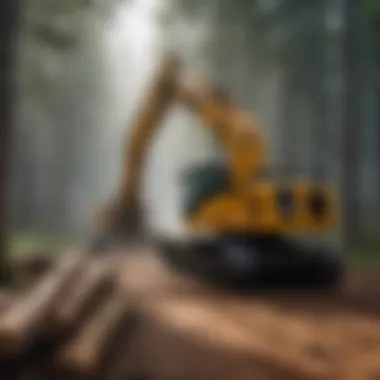Exploring the Integral Role of Logging Contractors in American Forestry Practices


Forest Management Techniques
Forestry professionals and academics hold a profound appreciation for the intricate processes involved in forest management techniques. Diving into the realm of sustainable logging practices opens up a vista of multifaceted strategies aimed at maintaining ecological balance while meeting demands for timber resources.
Wildlife Habitat Preservation
The heart of forestry management lies in preserving the rich tapestry of habitats that support a diverse array of wildlife species. Strategies range from maintaining natural habitat elements to implementing conservation zones that act as sanctuaries for native fauna.
Sustainable Logging Practices
Efforts towards sustainable logging practices underscore a commitment to responsible stewardship of forest resources. Such methods prioritize selective cutting, reduced impact logging, and reforestation initiatives to ensure the longevity of timber supplies.
Fire Prevention Measures
The threat of forest fires looms large, making it imperative to adopt comprehensive fire prevention measures. From creating buffer zones to implementing early detection systems, forest managers actively work to safeguard woodland ecosystems from the devastating effects of uncontrolled blazes.
Ecosystem Restoration Initiatives
Restoring degraded lands forms a critical aspect of contemporary forest management strategies. By undertaking ecosystem restoration initiatives, forestry professionals contribute to the renewal of biodiverse landscapes and the promotion of sustainable forest ecosystems.
Introduction
In the realm of American forestry, the pivotal role played by logging contractors cannot be overstated. These professionals form the backbone of efficient and sustainable forest management practices, ensuring the smooth execution of logging operations while upholding stringent environmental regulations. This article embarks on a journey to unravel the intrinsic significance of logging contractors in the intricate tapestry of forestry practices in the United States. By delving deep into their responsibilities, challenges, and contributions to sustainable forest management, we aim to shed light on the indispensable nature of these individuals in preserving our natural ecosystems.
To comprehend the essence of logging contractors in American forestry, we must first acknowledge the multifaceted nature of their profession. From the historic evolution of logging practices in the US to their modern-day adaptations in sync with environmental conservation efforts, the landscape of the logging contractor's role is both complex and diverse. Understanding the nuances of their craft is essential in grasping the gravity of their impact on forest ecosystems and wildlife habitats.
Moreover, as stewards of the land, logging contractors navigate a delicate balance between economic feasibility and environmental responsibility. Their ability to conduct harvesting operations while adhering to stringent safety regulations and mitigating environmental impacts is a testament to their professionalism and dedication to preserving the integrity of our forests. By exploring the breadth of their responsibilities and the challenges they encounter in the field, we gain a holistic view of the critical role they play in fostering sustainability within the forestry sector.


In this comprehensive exploration of logging contractors and their significance in American forestry, we aim to provide a nuanced understanding of their profession's essence. By shedding light on their contributions to sustainable forest management and environmental conservation, we can appreciate the vital role they play in safeguarding our precious natural resources for future generations.
Understanding the Logging Contractor Profession
In the exploration of American forestry practices, delving into the intricacies and significance of understanding the logging contractor profession becomes paramount. This section serves as the foundational bedrock upon which the entire article rests. By elucidating the role, responsibilities, challenges, and contributions of logging contractors, readers gain a nuanced perspective on the integral part these professionals play in forestry operations. Understanding the logging contractor profession offers profound insights into the intricacies of sustainable forest management, highlighting the necessary expertise and skills required to navigate the complexities of modern forestry practices.
Definition of a Logging Contractor
A logging contractor is a professional contracted to harvest timber from forests, responsible for operating specialized machinery and overseeing logging operations efficiently. These contractors often collaborate with forest owners, land managers, and forestry companies to ensure the sustainable harvesting of timber resources. Their role extends beyond mere timber extraction, encompassing forest management practices that prioritize ecological integrity and woodland health. Logging contractors leverage their expertise in forestry techniques to execute harvesting operations while adhering to stringent environmental regulations and industry standards, ensuring responsible resource utilization.
History of Logging Contractors in the US
The history of logging contractors in the United States traces back to the early days of forest exploitation for timber resources. From the pioneer loggers who manually felled trees for wood production to the mechanization of logging operations in the 20th century, the evolution of logging contractors parallels advancements in forestry technologies. Logging contractors have been integral to the development of the logging industry in the US, adapting to changing environmental regulations, socio-economic dynamics, and technological innovations. Understanding the historical context of logging contractors provides valuable insights into the progression of forestry practices and the lasting impact these professionals have had on shaping America's forestry landscape.
Role of a Logging Contractor in Modern Forestry
In contemporary forestry practices, logging contractors fulfill a multifaceted role that extends beyond timber harvesting. They are instrumental in implementing sustainable forest management strategies, promoting biodiversity conservation, and mitigating environmental impacts associated with logging operations. Modern logging contractors leverage innovative technologies, such as GPS-guided machinery and remote sensing tools, to optimize forest harvesting processes and minimize ecological disturbances. Their role in modern forestry is characterized by a holistic approach that integrates environmental stewardship with efficient timber extraction, highlighting the pivotal role these professionals play in balancing economic interests with ecological sustainability.
Responsibilities of a Logging Contractor
In delving into the essence of the topic 'Responsibilities of a Logging Contractor' within this article, it is imperative to grasp the pivotal role these professionals play in the holistic ecosystem of American forestry. Logging contractors bear significant responsibilities that contribute directly to the sustainable management of forest resources. They are tasked with executing the intricate operations involved in harvesting timber, ensuring compliance with stringent safety regulations, and mitigating environmental impacts to uphold the delicate balance of nature. By peering into the specific elements, benefits, and considerations associated with the responsibilities of logging contractors, we uncover a world where precision, expertise, and environmental consciousness intersect to safeguard the future of our forests.
Harvesting Operations
The realm of harvesting operations encapsulates the core function of a logging contractor's role in forestry. These skilled professionals are entrusted with the strategic felling, extraction, and processing of trees in a manner that optimizes resource utilization while maintaining forest health. A deep dive into this segment unveils the intricate processes involved in timber harvesting, including tree selection, cutting techniques, and log transportation methods. It underscores the meticulous planning and execution required to streamline operations without jeopardizing the sustainability of forest ecosystems. Harvesting operations serve as the backbone of a logging contractor's responsibilities, dictating the efficiency and effectiveness of timber extraction while preserving the integrity of natural habitats.
Safety Regulations Compliance
Compliance with safety regulations stands as a non-negotiable aspect of a logging contractor's responsibilities. In a profession laden with inherent risks, prioritizing the well-being of workers, equipment, and surrounding areas is paramount. Adherence to stringent safety protocols minimizes the likelihood of accidents, injuries, and environmental harm during logging operations. This section sheds light on the comprehensive measures implemented by logging contractors to uphold safety standards, encompassing training programs, equipment maintenance protocols, and emergency response mechanisms. Safety regulations compliance not only safeguards the personnel involved but also underscores the ethical and legal obligations inherent in responsible forestry practices.


Environmental Impact Mitigation
The proactive mitigation of environmental impacts constitutes a fundamental pillar of a logging contractor's responsibilities within the realm of American forestry. These professionals are tasked with implementing practices that minimize ecosystem disturbances, protect biodiversity, and conserve natural resources. By employing advanced technologies, strategic planning, and conservation strategies, logging contractors aim to reduce deforestation rates, soil erosion, and habitat degradation. This section elucidates the nuanced approaches adopted by logging contractors to mitigate environmental impacts effectively, showcasing their commitment to harmonizing timber extraction activities with conservation efforts. Through conscientious stewardship and eco-friendly initiatives, logging contractors play a pivotal role in preserving the ecological integrity of forested landscapes.
Challenges Faced by Logging Contractors
The section on Challenges Faced by Logging Contractors is a critical component of this article as it sheds light on the hurdles and obstacles that logging contractors encounter in their profession. By delving into the challenges faced by these professionals, we gain a deeper understanding of the complexities and demands of the logging industry. This section aims to explore specific elements that contribute to the difficulties faced by logging contractors, providing insights into their daily operations and the broader environmental and economic landscape.
Economic Pressures
Economic pressures represent a significant challenge for logging contractors in the United States. The logging industry is heavily influenced by market fluctuations, regulatory requirements, and operational costs. Logging contractors are tasked with managing expenses related to equipment maintenance, fuel, logistics, and labor, all of which can fluctuate based on market conditions and economic factors. Furthermore, logging contractors often operate on thin profit margins, making them vulnerable to economic downturns and changes in demand for timber products. Addressing economic pressures requires strategic financial planning, cost-effective practices, and agility in responding to market dynamics.
Environmental Concerns
Environmental concerns pose another major challenge for logging contractors. As stewards of the forest, logging contractors must navigate strict environmental regulations, sustainability requirements, and conservation considerations while carrying out their operations. Balancing economic interests with environmental protection is a delicate task that requires careful planning and adherence to best practices in sustainable forestry. From mitigating soil erosion to protecting water quality and wildlife habitats, logging contractors face the ongoing challenge of minimizing their environmental footprint and ensuring the long-term health of forest ecosystems. Embracing environmentally-friendly technologies and practices is essential for mitigating the impact of logging activities on the environment.
Technological Advancements
Technological advancements present both opportunities and challenges for logging contractors. In an increasingly digital and automated world, logging operations are becoming more sophisticated and data-driven. While technological innovations have the potential to enhance efficiency, safety, and sustainability in the logging industry, adopting and integrating new technologies can be costly and resource-intensive for contractors. Furthermore, staying abreast of rapidly evolving technologies requires continuous training and upskilling of the workforce. Logging contractors must strike a balance between leveraging cutting-edge equipment and maintaining traditional forestry practices to optimize productivity and uphold environmental standards. Embracing technological advancements is key to the future competitiveness and sustainability of logging operations in American forestry.
Importance of Logging Contractors in Sustainable Forestry
The importance of logging contractors in sustainable forestry cannot be overstated. These professionals play a vital role in ensuring that the delicate balance of our forest ecosystems is maintained for future generations. By carefully planning and executing logging operations, logging contractors help preserve the biodiversity and overall health of our forests.
In the context of sustainable forestry, logging contractors act as stewards of the land, working to minimize the impact of harvesting activities on the surrounding ecosystem. Through strategic harvesting practices, they can prevent habitat destruction and soil erosion, contributing to the long-term health of our forests.
Preservation of Forest Ecosystems


Preservation of forest ecosystems is at the core of a logging contractor's responsibilities. These professionals work diligently to minimize disruption to the natural environment during harvesting operations. By implementing sustainable logging practices, such as selective cutting and reforestation, logging contractors contribute to the preservation of diverse habitats within forests. This preservation ensures the continued health and biodiversity of the ecosystem, supporting various plant and animal species that rely on these forests for survival.
Promotion of Biodiversity
Promoting biodiversity is another significant aspect of logging contractors' work. By maintaining healthy forests through sustainable practices, logging contractors create habitats that support a wide range of plant and animal species. Biodiversity is crucial for the resilience of ecosystems, as it increases their ability to withstand environmental changes and disturbances. Through their efforts, logging contractors play a key role in supporting the interconnected web of life within forests, promoting the coexistence of diverse species and fostering ecosystem stability.
Contribution to Carbon Sequestration
Carbon sequestration is a critical process for mitigating climate change, and logging contractors play a significant role in this by contributing to carbon sequestration through sustainable forestry practices. Trees absorb carbon dioxide from the atmosphere during photosynthesis, storing carbon in their biomass and the soil. By managing forests sustainably and promoting reforestation, logging contractors help enhance the capacity of forests to sequester carbon, thereby reducing the concentration of greenhouse gases in the atmosphere. This contribution to carbon sequestration is essential for addressing climate change and maintaining the health of our planet's ecosystems.
Training and Certification for Logging Contractors
In the realm of American forestry, the training and certification of logging contractors play a pivotal role in ensuring the efficiency, safety, and sustainability of forest management practices. Logging contractors need to possess a diverse set of skills and undergo specialized training to execute their responsibilities effectively. These individuals are at the front lines of harvesting operations, navigating complex equipment and working in challenging environments. The acquisition of necessary skills is fundamental in enabling logging contractors to carry out their duties with precision and adherence to safety standards.
Acquiring Necessary Skills
Acquiring necessary skills in logging operations involves mastering techniques such as felling trees, operating machinery, and understanding forest ecology. Logging contractors must be well-versed in equipment maintenance, safety protocols, and environmental regulations. Additionally, skills in strategic planning, risk assessment, and team management are crucial for overseeing successful logging projects. Continuous development of these skills is essential to adapt to evolving industry practices and technological advancements.
Importance of Ongoing Education
Ongoing education for logging contractors serves as a cornerstone for professional growth and adaptation to industry changes. Staying updated on environmental regulations, technological innovations, and best practices not only enhances the efficiency of logging operations but also contributes to environmental stewardship. Continuous learning enables logging professionals to implement sustainable forestry techniques, mitigate environmental impacts, and promote biodiversity in forested areas.
Certification Programs for Logging Professionals
Certification programs tailored for logging professionals provide a structured pathway for skill development and industry recognition. These programs validate the expertise and competency of logging contractors, instilling confidence in clients and regulatory bodies. Certification highlights a commitment to high standards of safety, environmental stewardship, and ethical forest management practices. By enrolling in accredited certification programs, logging contractors gain access to cutting-edge training modules, networking opportunities, and resources to further elevate their professional capabilities.
Conclusion
In this conclusive section, it is imperative to highlight the fundamental elements that underscore the significance of logging contractors in the realm of modern forestry. Firstly, elucidating the direct correlation between the expertise of logging contractors and the preservation of forest ecosystems stands out as a primary takeaway. Their adeptness in harvesting operations while adhering to stringent safety regulations plays a crucial role in maintaining the delicate balance within forest environments.
Moreover, the benefits derived from their meticulous attention to environmental impact mitigation cannot be overstated. Logging contractors navigate the complexities of timber harvesting with a keen eye on sustainability, ensuring that their practices are in harmony with the natural landscape. By integrating eco-friendly strategies into their operations, they contribute significantly to the promotion of biodiversity and the long-term health of forest ecosystems.
Another key consideration in this conclusion is the role logging contractors play in carbon sequestration. Through their conscientious efforts to uphold environmentally sound practices, these professionals aid in trapping carbon dioxide and minimizing the impact of deforestation on climate change. The significance of their involvement in mitigating carbon emissions underscores the critical nature of their presence in the broader environmental conservation narrative.
In essence, the conclusion of this article not only synthesizes the information presented throughout but also underscores the vital role logging contractors play in shaping the future of American forestry. By reflecting on the multifaceted aspects of their responsibilities, the challenges they face, and the importance of their contributions, readers gain a comprehensive understanding of the indispensable nature of logging contractors in fostering sustainable practices within the forestry industry.



